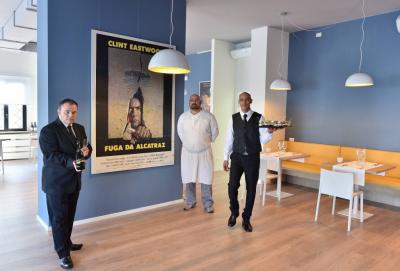When going out for dinner means going 'inside'

Rome—A model prison near Milan has become Italy’s first penal institution to host a fully functioning restaurant open to the public, providing work for inmates and an unaccustomed contact with the outside world.
Bollate Prison’s “InGalera” (In Prison) Restaurant is open six days a week for lunch and dinner and can cater for up to 52 people, advertising its menu with a slick website (www.ingalera.it) and accepting bookings by phone.
The dining space is bright and modern, with posters of prison films on the walls — Escape from Alcatraz, The Shawshank Redemption, the Green Mile — to provide an ironic reminder of the location. Paper table mats reiterate the theme, with reproductions of some of Bollate’s more forbidding sister institutions: the Ucciardone Prison in Palermo and neighbouring San Vittore in Milan.
The establishment, which was officially inaugurated last month, is run by a professional chef, Ivan Manzo, and the head waiter, Massimo Sestito, is also at liberty to leave once the work is over.
The remaining nine staff, both waiters and cooks, are all serving sentences in the prison. They are not new to the restaurant professions, however, since Bollate has a long-term cooperation with a neighbouring hotel and catering institute and 16 of its inmates are close to completing their diplomas.
The reasonably priced fare on offer recently included a starter of “petals of culatello ham with puntarelle and orange salad” for 13 euros, “broccoli soup with quails’ eggs” for 10 euros, and main courses of “pork shank flavoured with mint and lemon” (12 euros) or “fried swordfish with thyme and green vegetables” (18 euros).
“We want ordinary people to come, see and, if they like, talk to people who have committed crimes in order to reflect on how this process can help us to move beyond those crimes,” said Massimo Parisi, Bollate’s director.
The first ever prison dinners in Italy were pioneered by the Tuscan prison of Volterra, which began opening to the public around 10 years ago. But that venture, which pursues similar objectives, offers one-off dinners at a frequency of less than one per month.
InGalera is backed by charitable organisations and business ventures but its supporters are determined that it should support itself financially, rather than remaining “a nice idea”.
The project was partly inspired by a similar venture in Britain, known as The Clink, and by a London social enterprise, Brigade, which provides catering work for people who have experienced homelessness.
“Brigade is a bar and bistro near our headquarters in London which offers a hand-up to people in difficulty through work,” said Francesco Ferrara, a partner at accountants PwC in Milan, which offered financial support and expertise for the Italian project.
The Bollate Prison restaurant had brought together for-profit enterprises, a teaching cooperative and the justice ministry in a fusion of forces that is unusual for Italy, Mr Ferrara said. “We hope it’s going to be an example to others.”
“I worked as cook for three years in Bergamo Prison for 600 inmates,” a Moroccan prisoner, Azidin, told La Stampa newspaper. “Here I’m washing plates, but when I get out in eight years time I will have a healthy curriculum.”
Marco, an assistant chef with a background in bars and hotels before being sent to prison, was also positive about the experience.
“The chef is good and I have learnt new dishes,” he told the paper. “I ask people to come and see that here too we work with respect and discipline, when people imagine that prisons hold people who have never done anything in their lives but commit crimes. Before I ended up here, that’s what I thought too.”


